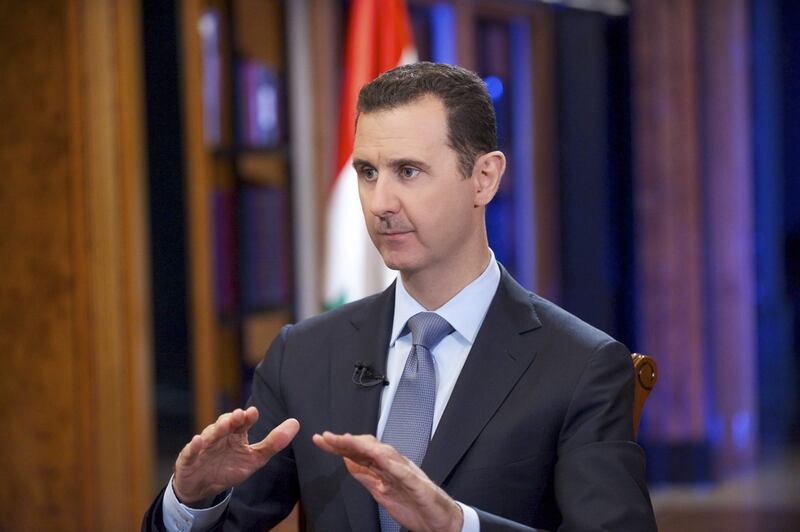After so much bloodshed and such utter devastation in Syria, much needs to be reconsidered.
Picture the paths of the Arab Spring revolutions as a graph and, over time, the lines have gone up and down in Egypt, Libya, Yemen and Tunisia, between hope and despair, through dialogues and protests.
In Syria, the line has maintained a steady downward trajectory since at least last year: more refugees, more destruction, more deaths. Between its rivers, between the Euphrates and the Orontes, is a basin of blood.
Tragically, none of this is new. And yet no one has any good ideas on how to end the war. As the threat of force has receded – Bashar Al Assad learnt the lesson of Saddam Hussein in Iraq, and rapidly dismantled his chemical weapons – so has the possibility of a forceful removal of Mr Al Assad's regime, or its decapitation.
But if the West and its Arab and Turkish allies won’t topple him by force, they are unlikely to be able to remove him with diplomacy.
The current diplomatic stalemate turns on the refusal of the National Coalition – the purported voice of the Syrian rebels outside of the country – to accept a role for Mr Al Assad in any future government. That is understandable, for the destruction of Syria is Mr Al Assad’s fault: it was his brutality that turned a peaceful uprising into a Hobbesian conflict.
But that demand also leaves little room for negotiation and little reason for Mr Al Assad, or his backers in Iran, to compromise. Continuing to demand what may well be impossible means condemning Syria to a lost decade or a lost generation.
Absent that, absent leaving Syria’s warring factions to tear themselves apart for years, only one unappetising choice remains: include Mr Al Assad in any peace treaty.
That would have sounded like treason just a year ago. To many of the most committed of anti-Assadists, it still will. But it has been a long year. Syria is being obliterated as a functioning state. Hundreds of thousands have been injured and killed. The number of Syrians who have had to leave their homes, either within Syria or without, is nine million – more than the populations of Paris, Berlin and Rome combined.
When the voices saying that this revolution has exacted too high a price become so loud, those of us not fighting must listen.
The argument for Mr Al Assad being part of any peace deal is that, without him and his security apparatus, the country would implode. And since Iran has shown itself unwilling to countenance any removal of Mr Al Assad, attempting to start negotiations with the precondition of his removal is pointless. Moreover, what is at stake is more than merely who governs Syria, but whether there is a Syria left to govern. Syria is perilously close to becoming so divided, so riven by conflict, that it cannot be put back together.
The example of the Lebanese civil war is often invoked, but invoked inaccurately, as if a generation of war were now inevitable. It is not. Syria today is not a case study of conflict: it is a war within its own context and a war in which there are still options, even if none of them is good. There are ways to end this conflict. Standing on the sidelines declaring airily that the conflict must “burn itself out” ignores the reality of the people being burnt.
Yet the Lebanese conflict is instructive. The longer it raged, the harder it was to find a solution. That process has begun in Syria, which has seen a once-united opposition fragment into groups, divided by ideology, geography and sect.
Without a political solution, that fragmentation will continue, possibly splitting Syria into several statelets, threatening new trouble for Turkey, Iraq and other neighbours. For now, the only viable political solution appears to be one that includes Mr Al Assad in some form.
But including Mr Al Assad in any political calculation will come with a heavy price. For Syrians, it will mean accepting that the man who started and prolonged this conflict remains in power.
For the West and the Arabs, it will mean accepting that they have failed; failed to stop the slaughter in Syria and failed to contain Iran.
For America, it will mean accepting a reduced diplomatic footprint. If Iraq signalled the end of American militarism, Syria may signal the end of its diplomatic strength in the region. Even without fighting, America and the Arabs have been weakened and are no longer able to turn the region to their will.
But all of that could be worthwhile if it ends the conflict. A solution will be entirely dependent on the Syrians themselves – any settlement, no matter who imposes it, no matter who argues for it, no matter who leads it, must be a settlement that Syrians themselves can accept. Attempting to impose any solution that does not satisfy a majority of Syrians will doom it to failure. After all, it is Syrians who have paid the price of the uprising, and it is they who will have to rebuild Syria from the ashes.
falyafai@thenational.ae
On Twitter: @FaisalAlYafai






